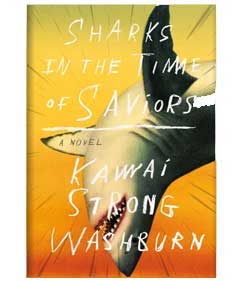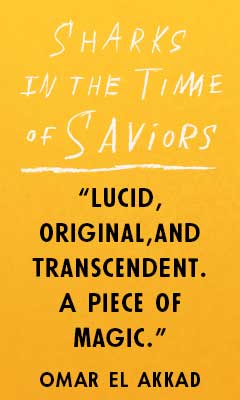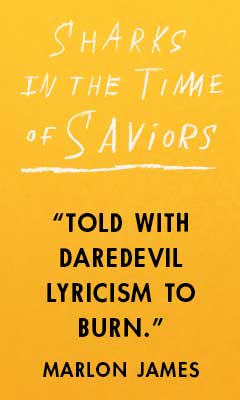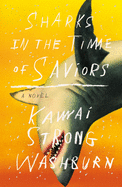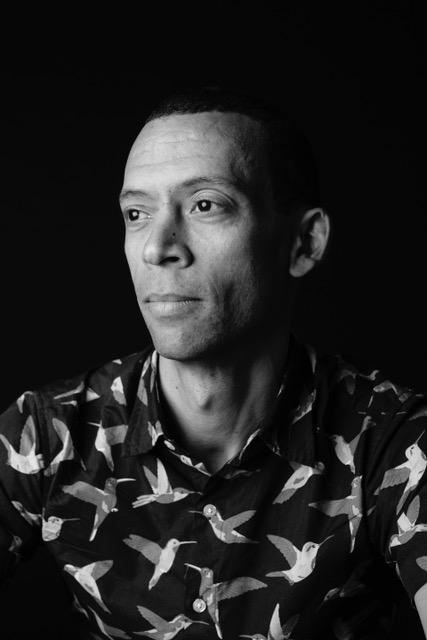Sharks in the Time of Saviors
by Kawai Strong Washburn
In Honoka'a in 1995, Malia remembers, "The kingdom of Hawai'i had long been broken--the hot rain forests and breathing green reefs crushed under the haole commerce of beach resorts, skyscrapers--and that was when the land had begun calling." She addresses one of her children: "When I close my eyes we're all still alive..." and she thinks back to the night "when your father and I were naked in his pickup truck, Waipi'o Valley, and we witnessed the night marchers."
The night marchers are the first sign of magic in a story that plays with the concept throughout. What is magic and what is imagination; what is myth and what truth; which are the forces for good? Where does modern medicine meet the inexplicable, and what alchemy results?
When middle child Nainoa ("Noa") is seven years old, he falls overboard in the waters off Kona and is surrounded by sharks. But instead of attacking, they carry him carefully back to the boat unharmed. This event is hailed as legend, a miracle, mark of the gods; in the years that follow, Noa's strangeness will help to bring his family partly out of the economic depression brought on by the fall of the sugarcane industry, but his gifts are dubious and unreliable. His siblings have talents of their own to offer, but are alienated by the obvious specialness of Noa, the chosen one.
The novel's perspective shifts, chapter by chapter, from Malia's to each of her children; Augie's voice will be heard only at the very end of this astonishing debut. Noa's chapters are precise and observant, Kaui's and Dean's variously disgruntled and colorful and more vernacular, Malia's reveal a close attention to larger meanings. Washburn's prose style shifts with these voices, but throughout he showcases lush description and stark contrasts. In Kaui's voice, "We set our toes and fingertips on razored bits of stone and slipped ourselves into the veined cracks of sheer walls of limestone or granite or basalt, all of it ceilinged by a thunder-brained sky."
All three children travel to the mainland in search of education and opportunity. In Spokane, basketball star Dean has earned a full scholarship but grapples with the pressures of school and sport. In San Diego, Kaui discovers drugs and free climbing and falls in love with a woman who does not want what Kaui wants. After Stanford, Noa moves to Portland, where he saves lives as an EMT. He has a good partner and loves her daughter, but still struggles with his gift. Perhaps his lifesaving ability is not what it seems. Despite the family's constant focus on Noa, the chapters that cover their separate lives offer refreshing views of Kaui and Dean, who are intriguing, flawed, engaging characters unto themselves. Their parents may center on Noa, but the novel resists doing so.
Amid various crises, each adult child will cycle back to the islands they call home. Noa, as always, leads the way, but Dean and Kaui have roles to fulfill within the family and on the islands, too. Their parents' needs are both burden and gift. Malia continues to question the apparent favor bestowed upon her middle child: "If you were more of the gods than of us--if you were something new, if you were supposed to remake the islands, if you were all the old kings moving through the body of one small boy--then of course I could not be the one to guide you to your full potential. My time as a mother was the same as those last gasping breaths of the owl." Each character is torn by the need to belong to a place and a people, the need to rescue and be rescued, to persist.
Sharks in the Time of Saviors is a gorgeous, rich, multifaceted novel. As it shifts between the mindsets of Malia and her three children, it poses questions behind their stories, interrogates joy and love and faith and loss, rage and redemption, the price and reward of returning home. This is a story about a small number of central characters and their often sad and painful daily lives, and also about more universal struggles. It's about past, present and future Hawai'i, including the racial tensions between native Hawai'ians and the haoles that have changed their world so much. It's about family, hope and risk.
Memorable characters, richly evoked settings, heartbreaking realism and alluring myth combine in a magical, expertly plotted, completely absorbing novel. Washburn takes his readers into a world that is both known and entirely new. --Julia Kastner



